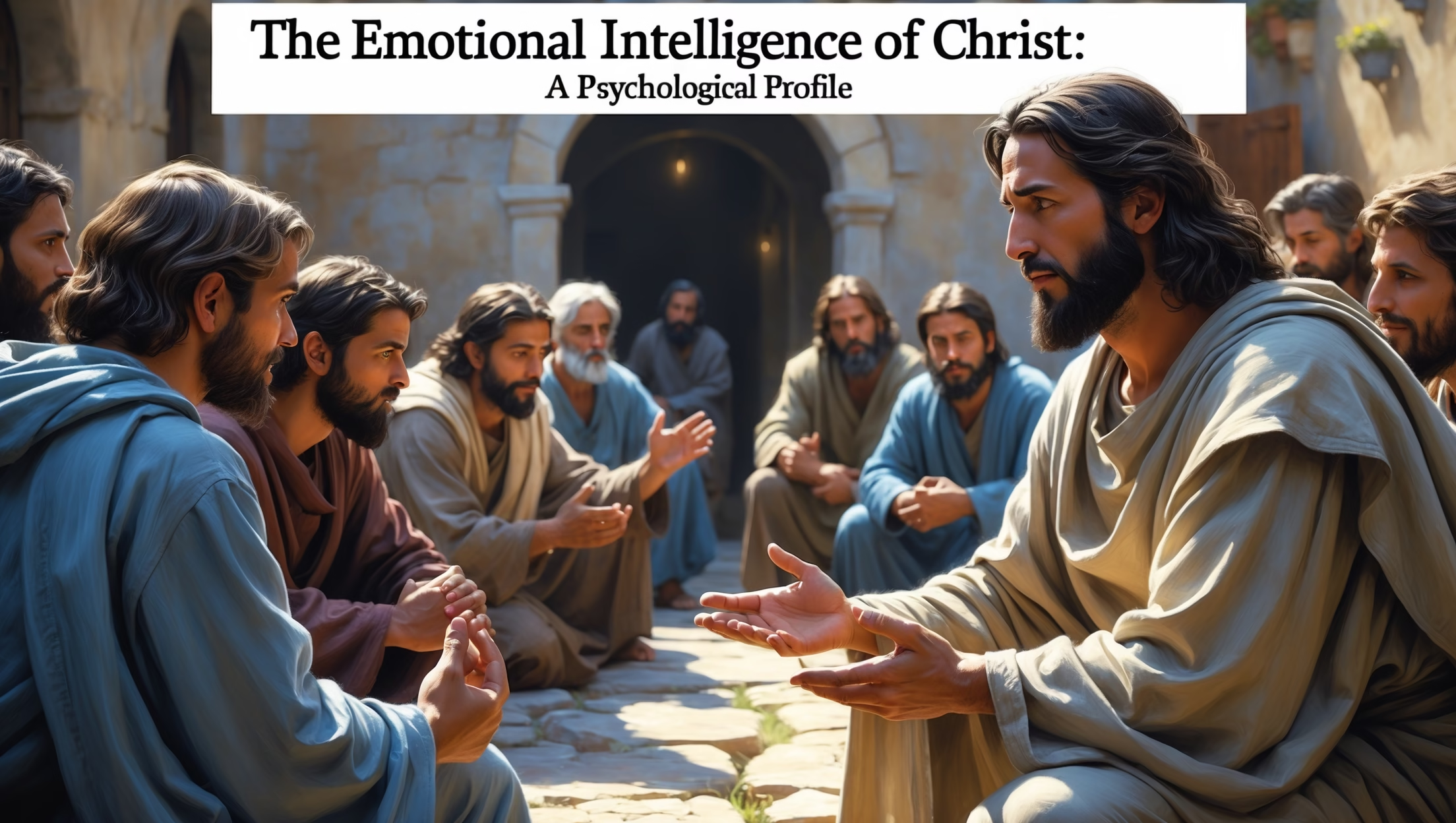How the Messiah Mastered Human Feelings
Jesus of Nazareth is often remembered for His teachings, miracles, and parables, but a closer examination of the Gospels reveals a mastery of human emotion that resonates with modern psychology. Emotional intelligence—the ability to perceive, interpret, and manage emotions in oneself and others—is a hallmark of effective leadership and interpersonal success. In Christ’s life, recorded interactions demonstrate remarkable balance, awareness, and purposeful engagement with human feelings, offering insights for both spiritual and secular contexts.
Understanding the emotional intelligence of Christ involves analyzing His management of anger, grief, joy, empathy, and relational dynamics. This profile not only deepens theological appreciation but also provides practical lessons for modern leaders, counselors, and anyone seeking to navigate human emotions with wisdom.

Anger Management: Purpose Over Impulse
A striking demonstration of Jesus’ emotional regulation occurs during the cleansing of the Temple (John 2:13-17). Observing merchants exploiting sacred space, He reacted with righteous indignation—overturning tables, driving out animals, and admonishing the money changers.
Unlike uncontrolled rage, Jesus’ anger was targeted, brief, and goal-oriented. Mark 3:5 contrasts His approach with mere frustration, noting that He first experienced grief before acting decisively. Psychologists recognize this as a mature response: acknowledging initial emotional impact, assessing the situation, and channeling feelings toward constructive action.
This pattern models conflict resolution and moral courage. Leaders can study Jesus’ measured expression of anger to learn how to respond assertively without allowing negative emotions to dominate judgment.
Grief Processing: Embracing Vulnerability
Jesus’ emotional intelligence also shines in His handling of grief. The shortest verse in the Bible, John 11:35—“Jesus wept”—occurs at Lazarus’ tomb. Here, Christ openly expresses sorrow, showing empathy for the mourning community while maintaining hope in resurrection.
Similarly, in Gethsemane (Mark 14:34), Jesus confronts fear and dread before His crucifixion. He does not suppress His emotions; instead, He articulates them, prays for strength, and ultimately submits to God’s will. This approach mirrors modern psychological practices of emotional acknowledgment, mindfulness, and adaptive coping.
By modeling the processing of grief, Jesus demonstrates that vulnerability is not weakness. Expressing sorrow, reflecting on it, and acting with purpose are integral to emotional intelligence.
Joy Expression: Sharing Celebration
Jesus’ emotional range extends beyond sorrow to genuine joy. Luke 10:21 records that He “rejoiced in the Spirit,” demonstrating spiritual elation rooted in divine connection and relational awareness. At the Wedding at Cana (John 2:1-11), He participates in celebration by performing His first public miracle, transforming water into wine.
This ability to engage in communal happiness underscores the social dimension of emotional intelligence. Joy, when shared appropriately, strengthens relationships, fosters trust, and promotes a sense of belonging—values critical to both ancient communities and modern organizations.
Empathy and Social Awareness
Emotional intelligence is incomplete without empathy—the capacity to understand others’ emotions and respond appropriately. Jesus repeatedly exhibits empathy in interactions with marginalized individuals:
- Healing the blind (Mark 8:23) and lame (Luke 13:10-17), recognizing both physical and social suffering.
- Comforting the grieving widow of Nain (Luke 7:13), acknowledging personal loss.
- Affirming the faith of the Syrophoenician woman (Mark 7:24-30), respecting her ingenuity despite cultural bias.
These encounters reveal a nuanced awareness of others’ emotional landscapes. By addressing both psychological and spiritual needs, Jesus fosters holistic well-being, demonstrating the relational intelligence central to effective leadership.
Leadership Applications: Lessons for Modern Contexts
Scholars and practitioners increasingly recognize the relevance of Christ’s emotional intelligence for contemporary leadership and counseling.
- Conflict Resolution: A Harvard Business Review analysis highlights how Jesus’ interactions in high-stakes situations, such as debates with Pharisees or tension-filled crowds, provide models for de-escalating conflict while maintaining ethical standards.
- Therapeutic Communication: Therapists study Gospel narratives to understand effective listening, reflective empathy, and guiding individuals toward insight without coercion.
- Organizational Leadership: Leaders in corporate and faith-based settings draw inspiration from Christ’s balance of assertiveness, compassion, and emotional attunement, applying these principles to team management, negotiation, and strategic decision-making.
Integration of Psychological Insight and Theological Understanding
By examining the emotional intelligence of Christ, we see that His ministry is not only spiritual but deeply relational and psychological. Emotional mastery enhances moral clarity, strengthens community bonds, and nurtures resilience in both individuals and groups.
- Anger, when expressed purposefully, reinforces justice.
- Grief, when acknowledged, cultivates empathy.
- Joy, when shared, builds social cohesion.
- Empathy, when practiced, empowers and heals.
Jesus’ example provides a template for integrating emotional insight with moral and spiritual objectives. His life illustrates that mastery over feelings does not negate human vulnerability but channels it toward meaningful action.
Modern Implications: Emotional Intelligence in Daily Life
The emotional intelligence of Christ has relevance far beyond religious study. In educational, therapeutic, and corporate environments, His approach offers a timeless blueprint:
- Self-Awareness: Recognize one’s emotions without being controlled by them.
- Self-Regulation: Transform emotion into constructive action.
- Empathy: Understand and validate others’ experiences.
- Social Skills: Cultivate relationships through attentive, compassionate interaction.
- Motivation: Align emotional energy with higher purpose and ethical objectives.
From pastors counseling congregants to CEOs leading diverse teams, the psychological insights gleaned from Jesus’ interactions remain profoundly applicable.
Key Insight: Christ as Model of Emotional Mastery
A careful reading of the Gospels portrays Jesus not only as teacher and Savior but also as an exemplar of emotional intelligence. His life demonstrates the integration of thought, feeling, and action—showing that emotional mastery is both human and divine. By studying His anger, grief, joy, empathy, and leadership style, modern readers can gain practical tools for navigating complex emotions in personal, professional, and spiritual contexts.
Ultimately, the emotional intelligence of Christ invites reflection on the ways we manage our own feelings and interact with others, reminding us that faith, psychology, and human relational skills are deeply intertwined.









